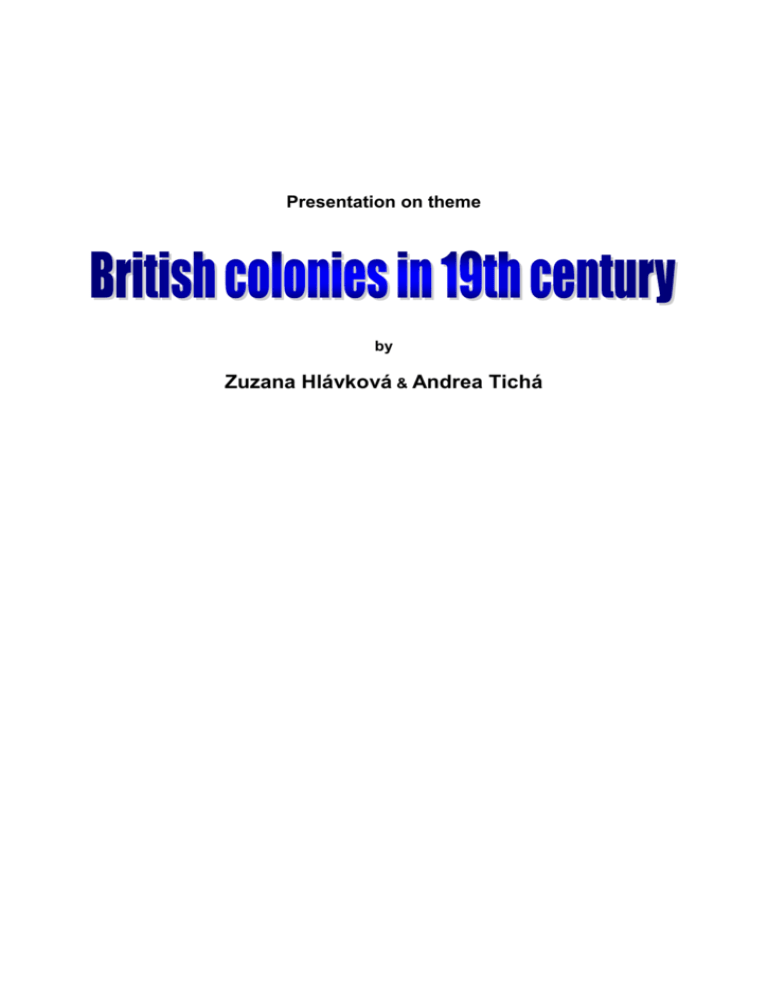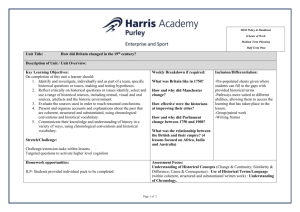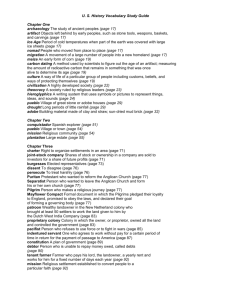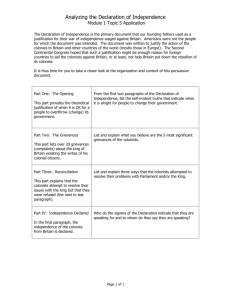British colonies in 19th century
advertisement

Presentation on theme by Zuzana Hlávková & Andrea Tichá The definition of the colony A colony is a territory under the immediate political control of a geographicallydistant state. Some colonies were historically separate countries, while others were territories without definite statehood at the moment of colonization. The metropolitan state is the state that owns the colony. A city that owns a colony is called a metropolis within this political organization. Mother country is the term used to refer to the metropolitan state by its citizens that live in a colony. In many cases colonies are referred to as overseas territories. Why Great Britain? - thanks to industrial revolution GB became powerful and rich country, economic progression - The ships from colonies then returned to Britain with cargoes of cotton, rum, sugar, and tobacco, produced mainly by the labour of the slaves. Britain's prosperity was bound up with the slave trade, until it became illegal 1807. In the 19th and early 20th centuries, the Empire made Britain one of the richest and most powerful nations in the world. Basic facts - The British Empire consisted of various territories all over the world conquered or colonized by Britain from about 1600, most now independent or ruled by other powers; the British Empire was at its largest at the end of World War I, consisting of over 25% of the world's population and area. - during the regin of Queen Victoria (1837 – 1901) the British empire covered ¼ of Earth´s surface - During the years 1851 – 1902 Britain had to war with almost all countries - The only part of world in 19th century that successfuly prevented from European colonization was USA - at the end of 19th century Canada, Australia and New Zealand were fully independent - 1931 Commonwealth (assosiation which is composed of former and remaining territories of the British Empire) What did the colonies received from GB? Positives: - English language, - an administrative and legal framework on the British model - economic development. - technological development Building of railways, roads, bridges, factories (especially in South-East Asia) - During decolonisation, Britain wanted to pass parliamentary democracy and the rule of law to its colonies. (Sometimes it had success.) - Religiuos missions (Although british missionaries made relatively little impression in places where advanced religions like Buddhism, Hinduism, or Islam dominated, even in those areas their converts numbered several millions.) Negatives: - gradual los sof sovereignty - cruel conflicts with aboriginal people - destroying of their culture - illnesses Areas of imperial activity Australia - the colonization of Australia had began to compensate the loss of American colonies - convict colony (British people who did some crimes were sent here. This was abolished in 1868. The former convicts didn´t ussualy come back to Britain but they began to establish settlements and as they were comming more inland they got into problems with the origin Australian people.) New Zealand - 1769 Captain Cook proclaims New Zealand British colony there were cruel conflicts between Europeans and Maories 1931 member of British Commonweatlh India - - India was at the heart of the British Empire but it was initially controlled not by the British government but by the East India Company . This huge company, chartered 1600, set up a number of factories, as their trading posts were called, and steadily increased its possessions and the territories over which it held treaty rights until its power extended from Aden in Arabia to Penang in Malaya, both vital ports of call for company vessels playing between Britain, India, and China. The East India Company was the most powerful private company in history, controlling India partly by direct rule and partly by a system of alliances with Indian princes, maintained by the Company's powerful army. The company's political power was ended by the Indian Mutiny 1857. Although this revolt was put down, it resulted in the Crown taking over the government of India 1858. Queen Victoria was proclaimed empress of India 1 Jan 1877. The British army fought two wars with Afghanistan (1839-41 and 1878-80) to protect India's northwest frontier and invaded Tibet 1904. British India gained independence as the two dominions of India and Pakistan 1947. In 1950 India became a republic but remained a member of the Commonwealth. East Asia - When the Netherlands came under French occupation (1793-1815) the East India Company took the opportunity to occupy parts of the East Indies, such as Ceylon (now Sri Lanka) annexed to the East India Company 1796. When the British government took over from the company it also acquired the Straits Settlements and by 1914 all Malaya was under British control. Britain gained Hong Kong as a result of the Opium Wars 1839-42. West Indies - The West Indies was a very attractive target for colonization due to the huge commercial possibilities of the region, mainly the rum and sugar produced there. Between 1623 and 1632 English settlers occupied St Kitts, Barbados, St Croix (later lost), Nevis, Antigua and Montserrat. Cromwell's forces took Jamaica from the Spaniards 1655, although it was not officially ceded until 1760, and the tiny Atlantic island of St Helena was annexed 1673. Belize (British Honduras) was governed as part of Jamaica until 1884. Burma - (now Myanmar) became a province of British India 1886 after a series of Anglo-Burmese Wars from 1824. Egypt - 1875 Britain buys stocks of Suez Channel – very important for trade later in 1917 Egypt became protectorate Southern Africa - - The Cape of Good Hope in South Africa was occupied by two English captains 1620, but initially neither the government nor the East India Company was interested in developing this early settlement into a colony. Under the Treaty of Paris 1814, the UK bought Cape Town from the new kingdom of the Netherlands for $6 million. British settlement began 1824 on the coast of Natal, proclaimed a British colony 1843. Cecil Rhodes' British South Africa Company, chartered 1889, extended British influence over Southern Rhodesia (a colony 1923) and Northern Rhodesia (a protectorate 1924); with Nyasaland, taken under British protection 1891, the Rhodesias were formed into a federation 1953-63 with representative government. West Africa - The British showed little interest in Africa outside the Cape until the scramble for territory of the 1880s, although a few forts were kept in West Africa, where gold and ivory kept their importance after the slave trade was ended by Britain in 1807. An early exception was the colony of Sierra Leone founded 1788 with the cession of a strip of land to provide a home for liberated slaves; a protectorate was established over the hinterland 1896. British influence in Nigeria began through the activities of the National Africa Company (the Royal Niger Company from 1886), which bought Lagos from an African chief 1861 and steadily extended its hold over the Niger Valley until it surrendered its charter 1899; in 1900 the two protectorates of North and South Nigeria were proclaimed. World War I ousted Germany from the African continent, and in 1921-22, under League of Nations mandate, Tanganyika was transferred to British administration, SW Africa to South Africa; Cameroons and Togoland, in West Africa, were divided between Britain and France. East Africa - Maps Uganda was made a British protectorate 1894. Kenya, formerly a protectorate, became a colony 1920, certain districts on the coast forming part of the sultan of Zanzibar's dominions remained a protectorate. Northern Somalia came under direct control of the British government 1884 Decline The old British colonial system began to decline in the 18th century. During the long period of unbroken Whig dominance of domestic political life (1714–62), the Empire became less important and less well-regarded, until an ill-fated attempt (largely involving taxes, monopolies, and zoning) to reverse the resulting "salutary neglect" provoked the American War of Independence (1775–83), depriving Britain of her most populous colonies. The period is sometimes referred to as the end of the "first British Empire", indicating the shift of British expansion from the Americas in the 17th and 18th centuries to the "second British Empire" in Asia and later also Africa from the 18th century. The loss of the Thirteen Colonies showed that colonies were not necessarily particularly beneficial in economic terms, since Britain could still dominate trade with the excolonies without having to pay for their defence and administration. Mercantilism, the economic doctrine of competition between nations for a finite amount of wealth which had characterised the first period of colonial expansion, now gave way in Britain and elsewhere to the laissez-faire economic liberalism of Adam Smith and successors like Richard Cobden. The lesson of Britain's North American loss — that trade might continue to bring prosperity even in the absence of colonial rule — contributed to the extension in the 1840s and 1850s of self-governing colony status to white settler colonies in Canada and Australasia whose British or European inhabitants were seen as outposts of the "mother country". Ireland was treated differently because of its geographic proximity, and incorporated into the United Kingdom of Great Britain and Ireland in 1801; due largely to the impact of the Irish Rebellion of 1798 against English rule. During this period, Britain also outlawed the slave trade (1807) and soon began enforcing this principle on other nations. By the mid-19th century Britain had largely eradicated the world slave trade. Slavery itself was abolished in the British colonies in 1834, though the phenomenon of indentured labour retained much of its oppressive character until 1920. The end of the old colonial and slave systems was accompanied by the adoption of free trade, culminating in the repeal of the Corn Laws and Navigation Acts in the 1840s. Free trade opened the British market to unfettered competition, stimulating reciprocal action by other countries during the middle quarters of the 19th century. Some argue that the rise of free trade merely reflected Britain's economic position and was unconnected with any true philosophical conviction. Despite the earlier loss of 13 of Britain's North American colonies, the final defeat in Europe of Napoleonic France in 1815 left Britain the most successful international power. While the Industrial Revolution at home gave her an unrivalled economic leadership, the Royal Navy dominated the seas. The distraction of rival powers by European matters enabled Britain to pursue a phase of expansion of her economic and political influence through "informal empire" underpinned by free trade and strategic preeminence. Between the Congress of Vienna of 1815 and the Franco-Prussian War of 1870, Britain was the world's sole industrialised power, with over 30% of the global industrial output in 1870. As the "workshop of the world", Britain could produce finished manufactures so efficiently and cheaply that they could undersell comparable locally produced goods in foreign markets. Given stable political conditions in particular overseas markets, Britain could prosper through free trade alone without having to resort to formal rule. The Americas in particular (especially in Argentina and the United States) were seen as being well under the informal British trade empire due to Britain's enforcement of the Monroe Doctrine keeping other European nations from establishing formal rule in the area. Literature: The Kingfisher History Encyclopedia, Encyklopedie Zeměpis světa (G. Bateman, V. Eganová), Encyklopedie Historie světa (J. Haywood, B. Catchpole), internet (wikipedia)








